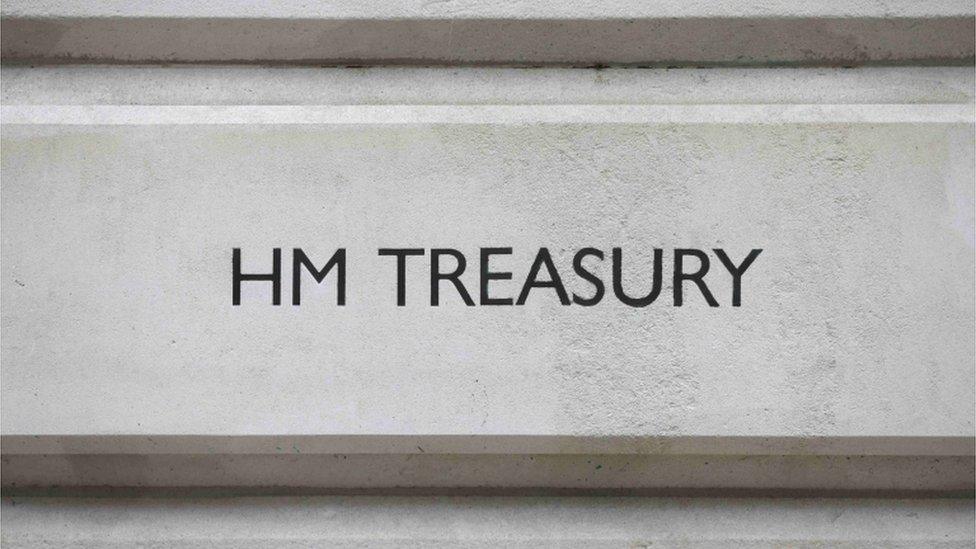Holyrood and Westminster 'some distance' from finance deal
- Published

The Scottish and UK governments are "some distance" from a deal on new financial arrangements for Holyrood, according to Scotland's finance secretary.
John Swinney took part in negotiations with Treasury counterparts on Monday.
It came after the Treasury made a revised offer over the fiscal framework governing the level of spending available to the Scottish Parliament.
Mr Swinney said discussions would continue later in the week.
Speaking after the meeting , he said: "We are not at an agreement yet, and we have some distance to go before we get to an agreement.
"So, we have agreed to have further discussions in the course of this week and with a view to perhaps a meeting next week to take these issues forward, but there is still some considerable distance to travel."
A spokesperson for the UK government said the talks, the eighth round of discussions, had shown its willingness to "engage with and listen to" the Scottish government's concerns.
The spokesperson added: "We have agreed to speak again in the coming days and, while there are still some difficult issues to resolve, we remain confident that a deal can be reached that is fair to Scotland and fair to the rest of the UK, now and in the future."
The Scottish government has said it wants an agreement by 12 February.
It has threatened to veto the Scotland Bill, which will hand the Scottish Parliament new powers over areas including income tax, VAT and some welfare and benefits, if any deal on the fiscal framework is "unfair to Scotland".
BBC Scotland political editor Brian Taylor had said he expected the Treasury to take a "different approach" during Monday's talks.
He said: "I think they will propose a form of comparability between Scotland and the rest of the UK just as the Barnett formula does for spending.
"It will, if you like, be a new Barnett formula for both tax and for welfare, and I am told that if it had been applied since 1999 it would have meant marginally more in spending for Scotland than is the case under Barnett."

Analysis by Brian Taylor, BBC Scotland political editor
It is intriguing to note that as the talks progress - or stall - they are accompanied by emerging exit strategies from both sides. In essence, they are preparing their excuses, with each getting ready to blame the other for failure.
The exit strategies are evident. The Scottish government will say that they were determined to secure new income tax powers for Holyrood - but not at any price.
Ministers profess themselves astounded that their Scottish opponents are seemingly willing to accommodate any offered deal. Said opponents deny such credulity.
The UK government - chief secretary, chancellor, prime minister - are crafting a back-up narrative which will say that they made every effort to redeem the Vow, to implement the Smith Commission but encountered Scottish intransigence.
More talking to come, beyond today, I suspect. But, despite those exit strategies, despite the tough negotiations, I still expect a deal to emerge.

Speaking ahead of the talks in London, Scottish First Minister Nicola Sturgeon said the proposals tabled by the Treasury in the past few days "would still reduce the Scottish budget by potentially billions of pounds over the next few years."
She also said the proposals would not fulfil the Smith Commission's no detriment principle - which stated that neither the UK or Scottish governments should suffer financially from policy decisions made by the other once the new powers come into force.
'Fair deal'
Ms Sturgeon told the BBC's Good Morning Scotland programme: "The formula that we have been proposing - and we have actually proposed a compromise to deal with some of the concerns that the UK government has about this formula - wouldn't leave the Scottish government worse off simply as a result of transferring the powers.
"I want to get a deal. I want to have new powers. It is no secret that I would rather have many more new powers.
"I am not asking for any special favours here for Scotland.
"I am simply asking for a fair deal and as first minister I wouldn't be doing my job properly, and I wouldn't be serving the people of Scotland well, if I signed up to a deal that over the next few years would strip billions of pounds out of the Scottish budget regardless of the decisions that the Scottish government took."

Both sides have said they want a deal on the fiscal framework in place in time to allow the Scotland Bill to be passed before May's Holyrood election
Ms Sturgeon also highlighted support for the Scottish government's position from Glasgow University principal Prof Anton Muscatelli.
Writing in the Herald newspaper, external, Mr Muscatelli said Mr Swinney's preferred option, a mechanism known as per capita indexed deduction, "provides a fair deal for both Scotland and the rest of the UK".
He said: "This method ensures that the simple transfer of the new tax powers would not in itself lead to an increase or cut in Scotland's budget.
"This is of crucial importance, as it retains the Barnett formula as the principal determinant of public spending in Scotland, something that was central to the Smith recommendations."
'Dither and delay'
He warned that under an alternative method known as index deduction, Scotland could lose about £3.5bn from its block grant in the first 10 years of the new powers.
Meanwhile, Labour has called for the both governments to "put politics aside and get a good deal for Scotland", and accused the two sides of "dither and delay" over the fiscal framework.
Shadow Scottish Secretary Ian Murray said: "People across Scotland have been left in the dark by a negotiation that has taken place behind closed doors and away from any public scrutiny.
"These discussions should have been concluded before the end of last year, but we are now just months away from the Scottish election and no agreement has been reached."